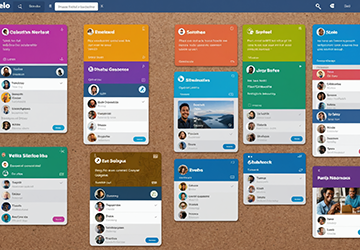
Essential Project Management Tools For Remote Teams
In the ever-evolving landscape of remote work, the right project management tools can make or break a team’s productivity. As businesses continue to adapt to the new norm of distributed workforces, it’s more critical than ever to find solutions that not only enhance efficiency but also foster collaboration and maintain seamless communication. Whether you’re a startup founder, a project manager, or an independent consultant, these essential project management tools are designed to keep your remote team on track and thriving.
In the ever-evolving landscape of remote work, the right project management tools can make or break a team’s productivity. As businesses continue to adapt to the new norm of distributed workforces, it’s more critical than ever to find solutions that not only enhance efficiency but also foster collaboration and maintain seamless communication. Whether you’re a startup founder, a project manager, or an independent consultant, these essential project management tools are designed to keep your remote team on track and thriving.
Trello: Visual Collaboration at Its Best
Trello is a powerhouse when it comes to visual project management. This versatile tool uses boards, lists, and cards to help teams organize tasks and projects in an intuitive, user-friendly manner. Trello’s strength lies in its flexibility, allowing teams to customize workflows to fit their unique needs. From marketing campaigns to product development, Trello’s drag-and-drop interface makes task management a breeze.

One of the standout features of Trello is its integration capabilities. Trello seamlessly integrates with a wide array of apps such as Slack, Google Drive, and Jira, ensuring that all your tools work together harmoniously. Additionally, Trello’s Power-Ups enable teams to add specific features and integrations to boards, enhancing functionality without overwhelming users with unnecessary complexity.
Asana: Streamlined Workflows for Maximum Efficiency
Asana is another top-tier project management tool that excels in creating streamlined workflows for remote teams. With Asana, you can break down projects into manageable tasks, assign them to team members, set deadlines, and track progress all in one place. Asana’s clean interface and robust feature set make it an excellent choice for teams looking to increase productivity and accountability.
Asana offers a variety of views, including list, board, calendar, and timeline, to suit different project management styles. Its advanced search and reporting features allow teams to gain insights into project performance and identify bottlenecks. Moreover, Asana’s integrations with tools like Microsoft Teams, Zoom, and Salesforce ensure that your team’s communication and collaboration efforts are seamlessly connected.
Monday.com: A Comprehensive Work Operating System
Monday.com is not just a project management tool; it’s a comprehensive work operating system designed to handle every aspect of your team’s workflow. With its highly customizable platform, Monday.com allows teams to build their workflows from scratch or use pre-built templates to get started quickly. This flexibility makes it suitable for a wide range of industries and project types.
One of the key advantages of Monday.com is its ability to automate repetitive tasks, saving your team valuable time and reducing the risk of human error. Its visual dashboards provide real-time insights into project status, helping teams stay informed and make data-driven decisions. Additionally, Monday.com’s extensive integration options, including integrations with Zapier, Slack, and Google Calendar, ensure that your team’s tools are always in sync.
Slack: The Ultimate Communication Hub
While Slack is primarily known as a communication tool, its project management capabilities make it an indispensable part of any remote team’s toolkit. Slack’s channels allow teams to organize conversations by topics, projects, or departments, making it easy to keep discussions focused and relevant. With Slack, teams can share files, set reminders, and even conduct video calls, all within a single platform.
One of the most powerful features of Slack is its app ecosystem. With thousands of apps available in the Slack App Directory, teams can integrate their favorite tools directly into Slack, streamlining workflows and reducing the need to switch between multiple platforms. Slack’s powerful search functionality also ensures that important information is always just a few keystrokes away.
ClickUp: All-In-One Project Management Solution
ClickUp is an all-in-one project management solution that aims to replace multiple tools with a single, unified platform. With ClickUp, teams can manage tasks, documents, goals, and time tracking all in one place. Its highly customizable interface allows teams to tailor the platform to their specific needs, making it an ideal choice for businesses of all sizes.
ClickUp’s standout feature is its ability to adapt to different project management methodologies. Whether your team follows Agile, Waterfall, or a hybrid approach, ClickUp has the tools and flexibility to support your preferred workflow. Its robust reporting and analytics capabilities provide valuable insights into team performance, helping managers make informed decisions and drive continuous improvement.
Basecamp: Simple, Effective, and User-Friendly
Basecamp is a project management tool that focuses on simplicity and ease of use. With its straightforward interface, Basecamp makes it easy for teams to collaborate and stay organized without the learning curve associated with more complex tools. Basecamp’s core features include to-do lists, file sharing, message boards, and a centralized schedule, providing all the essentials for effective project management.
One of the unique aspects of Basecamp is its emphasis on asynchronous communication. By encouraging teams to document discussions and decisions in message boards and project updates, Basecamp helps reduce the need for constant meetings and interruptions. This approach is particularly beneficial for remote teams working across different time zones.
Microsoft Teams: Collaboration and Communication in One
Microsoft Teams is a powerful collaboration platform that combines chat, video conferencing, file sharing, and project management into a single, integrated solution. With Microsoft Teams, remote teams can communicate and collaborate in real-time, ensuring that everyone stays connected and informed. Teams’ integration with Microsoft Office 365 provides seamless access to tools like Word, Excel, and PowerPoint, enhancing productivity and collaboration.

One of the standout features of Microsoft Teams is its ability to create dedicated channels for different projects or departments. This organization helps keep conversations focused and relevant, making it easier for team members to find the information they need. Additionally, Teams’ robust security features ensure that your data is protected, giving you peace of mind as you collaborate online.
Wrike: Advanced Project Management for Complex Workflows
Wrike is a feature-rich project management tool designed for teams handling complex workflows and large-scale projects. With Wrike, teams can create detailed project plans, set dependencies, and track progress using Gantt charts and Kanban boards. Wrike’s advanced analytics and reporting tools provide deep insights into project performance, helping teams stay on top of deadlines and deliverables.
One of Wrike’s key strengths is its ability to support collaborative work across different departments and teams. With features like request forms, proofing tools, and custom workflows, Wrike ensures that everyone involved in a project can contribute effectively and stay aligned. Wrike’s extensive integration options, including integrations with Salesforce, Adobe Creative Cloud, and QuickBooks, further enhance its versatility and usefulness.
Notion: The Ultimate Productivity Tool
Notion is a productivity powerhouse that combines note-taking, task management, and collaboration into a single platform. With Notion, remote teams can create and share documents, databases, and wikis, making it an ideal tool for knowledge management and project collaboration. Notion’s flexible and customizable interface allows teams to build their own workflows and organize information in a way that makes sense for them.
One of the standout features of Notion is its ability to bring together different types of content in a single workspace. Whether you’re creating a project plan, documenting meeting notes, or tracking tasks, Notion provides the tools you need to stay organized and productive. Notion’s strong integration capabilities, including integrations with Slack, Google Drive, and Trello, ensure that your team’s tools work together seamlessly.
Smartsheet: Powerful Project Management with Spreadsheets
Smartsheet combines the familiarity of spreadsheets with powerful project management features, making it an excellent choice for teams that rely heavily on data and analytics. With Smartsheet, teams can create detailed project plans, track progress, and collaborate in real-time, all within a flexible, spreadsheet-like interface. Smartsheet’s robust automation capabilities help teams streamline workflows and reduce manual tasks.
One of the key advantages of Smartsheet is its ability to handle complex projects with multiple dependencies and stakeholders. With features like Gantt charts, resource management, and reporting, Smartsheet provides the tools teams need to manage large-scale projects effectively. Smartsheet’s extensive integration options, including integrations with Microsoft Office 365, Google Workspace, and Salesforce, further enhance its versatility and usefulness.
Airtable: A Modern Database for Project Management
Airtable is a modern database platform that combines the best of spreadsheets and databases to provide a powerful project management solution. With Airtable, teams can create customizable databases to track projects, tasks, and resources, making it easy to organize and manage information. Airtable’s flexible interface allows teams to view data in different ways, including grid, calendar, and Kanban views.
One of the standout features of Airtable is its ability to create relational databases, allowing teams to link related information and gain deeper insights into their projects. Airtable’s strong integration capabilities, including integrations with Slack, Google Drive, and Zapier, ensure that your team’s tools work together seamlessly. Whether you’re managing a marketing campaign or a product development project, Airtable provides the tools you need to stay organized and productive.
In conclusion, the right project management tool can transform the way your remote team works, enhancing collaboration, productivity, and efficiency. Each of the tools mentioned above offers unique features and benefits, making it essential to choose the one that best fits your team’s needs and workflow. By leveraging these powerful tools, you can ensure that your remote team stays connected, organized, and on track to achieve its goals.





